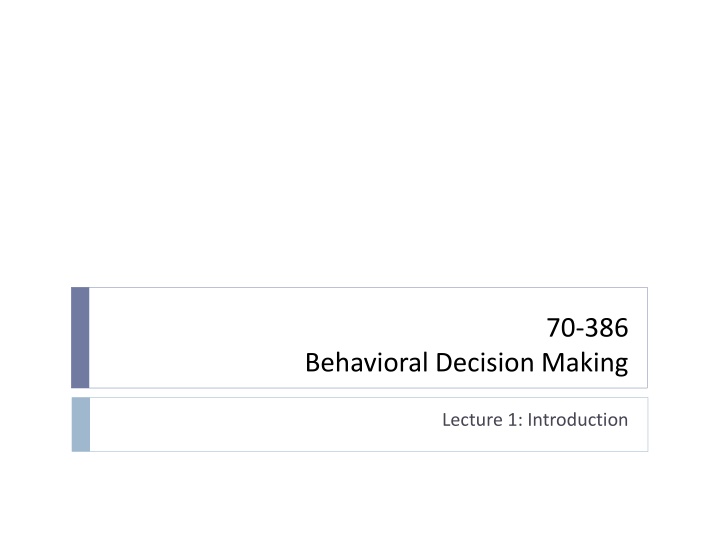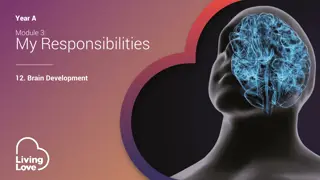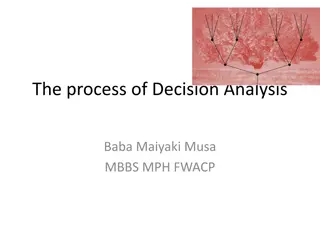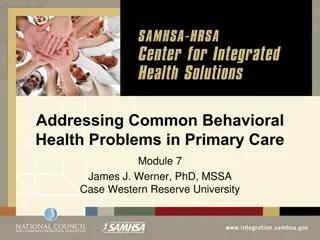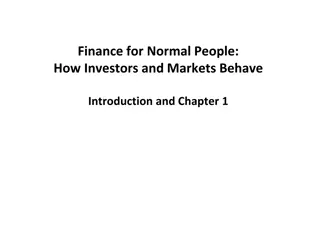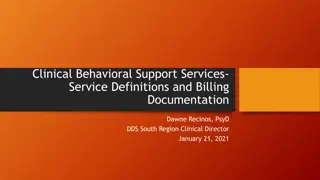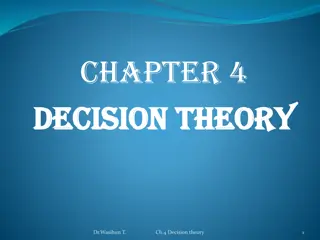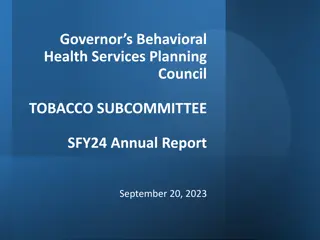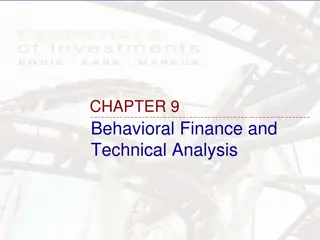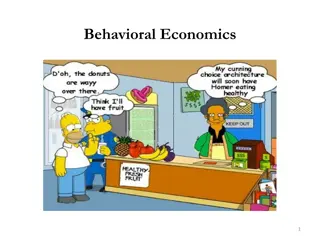70-386 Behavioral Decision Making
Dive into the world of behavioral decision making with this introductory lecture. Explore key concepts, theories, and real-life examples that shape our choices and actions. Gain insights into how our psychology influences decisions and learn strategies to enhance decision-making skills. Whether for personal growth or professional development, this lecture sets the stage for a deeper understanding of the intricate processes behind decision-making.
Download Presentation

Please find below an Image/Link to download the presentation.
The content on the website is provided AS IS for your information and personal use only. It may not be sold, licensed, or shared on other websites without obtaining consent from the author.If you encounter any issues during the download, it is possible that the publisher has removed the file from their server.
You are allowed to download the files provided on this website for personal or commercial use, subject to the condition that they are used lawfully. All files are the property of their respective owners.
The content on the website is provided AS IS for your information and personal use only. It may not be sold, licensed, or shared on other websites without obtaining consent from the author.
E N D
Presentation Transcript
70-386 Behavioral Decision Making Lecture 1: Introduction
What is Behavioral Decision Research? What is an optimal decision? Normative: Decision Analysis / Economics What do we need to understand in order to make good decisions? Quality of information. How do people actually make decisions? Descriptive: Psychology Limits on the quality of information or limits on the quality of decision making capabilities. How can people be helped to make better decisions (by overcoming these biases)? Prescriptive: Public Policy Risk communication or limit choices
Cognitive Illusions Cognitive illusions are similar to optical illusions in that they, too, can cause us to misperceive the world Biases emerge in: Drawing comparisons Evaluating probabilities Reasoning from the past Extrapolating from limited data Assessing our own values .....
Some things you might learn in this course Why adding a product nobody buys may be beneficial to the seller Why people might donate more to save one person rather than 1000s Why someone might be risk-adverse sometimes and risk- seeking sometimes even when facing the same choice A reason why too many people start businesses that fail.
Course Logistics This is a mini course. Fast pace: a lot of material per meeting almost a chapter per class and classes meet 3x a week. Attendance and Participation Required. Participation is not just coming to class. Phones / computers If you d rather check FB/twitter/snapchat/instagram/etc than pay attention, don t come to class. Office hours: Tuesday morning 10:30-12 Outside of set office hours, set up an appointment.
Course Grades Course grades will be based on: Participation 5% Problem Sets 15% Midterm exam 15% Three weeks from Thursday! Final exam 20% Quizzes 30% (10% each, best 3 of 4) First quiz next Sunday (1 week from today!) Group paper presentation: 15%
Course Schedule See the last page of the syllabus for a tentative schedule Readings after week two aren t list; they will be. There is a natural progression of material in Economics/Decision Analysis. Less so in BDR BDR is a much younger field. A coherent theory for everything we ll discuss still isn t exactly worked out. Doesn t mean that it s wrong just that we re still trying to figure things out.
Teaching this course. Second time I ve taught this course There will be changes throughout the course. Usually it takes about 3 times before I think a course is about right. Sorry, but you have to start somewhere. But we ll work together. The material is interesting. And the course is meant to give you an overview of a field you probably haven t seen. I love my job. I want to teach the best that I can. But to do that I need to get to know you Stop by my office this week for 5-10 min, even if you ve had me before.
Recommended books We ll draw on these later in the course, but if you find the material interesting, definitely check out (in the library or on kindle): Nudge, by Thaler and Sunstein Thinking Fast and Slow, by Kahneman Predictably Irrational, by Ariely
Next time by 26/8/14 Read Chapter 2 in JMDM Meet with me this week
Decision Making Review
Decision Evaluation I bought a lottery ticket and won $10,000 Was buying the ticket a good decision? Why or Why Not? Ex post or ex ante? How do you measure the quality of a decision? Outcome Quality Decision Process Quality
Optimal decision analysis Define the problem Do NOT define in terms of a proposed sol n or diagnosed symptoms. 1. Identify the criteria What s the objective? Is there more than one? 2. Weigh the criteria What matters? Some things matter more than others 3. Generate alternatives What are the courses of action available? 4. Rate each alternative on each criterion What are the payoffs? Is there any uncertainty? Do you need to forecast future events? 5. Compute the optimal decision What is your utility function? What is your tolerance for risk? 6.
Evaluating the Process The soundness of the decision-making process determines the quality of the decision, not the attractiveness of the outcome. Making the optimal decision is tough. Satisficing: making a choice that is good enough rather than optimizing to find the ideal choice (Herb Simon 1956). Example: choosing a college or university. Heuristics: Decision aids or shortcuts that we rely on to make complex decisions manageable. What might affect our decision-making processes Reliance on heuristics often leads to biases --- deviations from normatively sound perceptions and judgments. Optical Illusions as an Analogy: The image we see may lead us to a mistaken or biased representation of reality
Difference are not always mistakes Two equally valid interpretations of the same data. Can we justify differences? Subjective probability: different interpretations of same set of evidence (Leonard Savage 1954) Personally value outcomes differently Risk Judgments (e.g. cars vs. airplanes) Value Elicitation (e.g. Fischhoff 1991) Normative and descriptive analysis are interdependent!
Results from Psychology vs Economics Economics : Psychology Irrational Decision Makers ( humans ) Homo economicus Stable, complete and transitive preferences Unstable preferences Context matters Utility maximizers Satisficing + systematic errors `Perfect foresight Normative Descriptive
